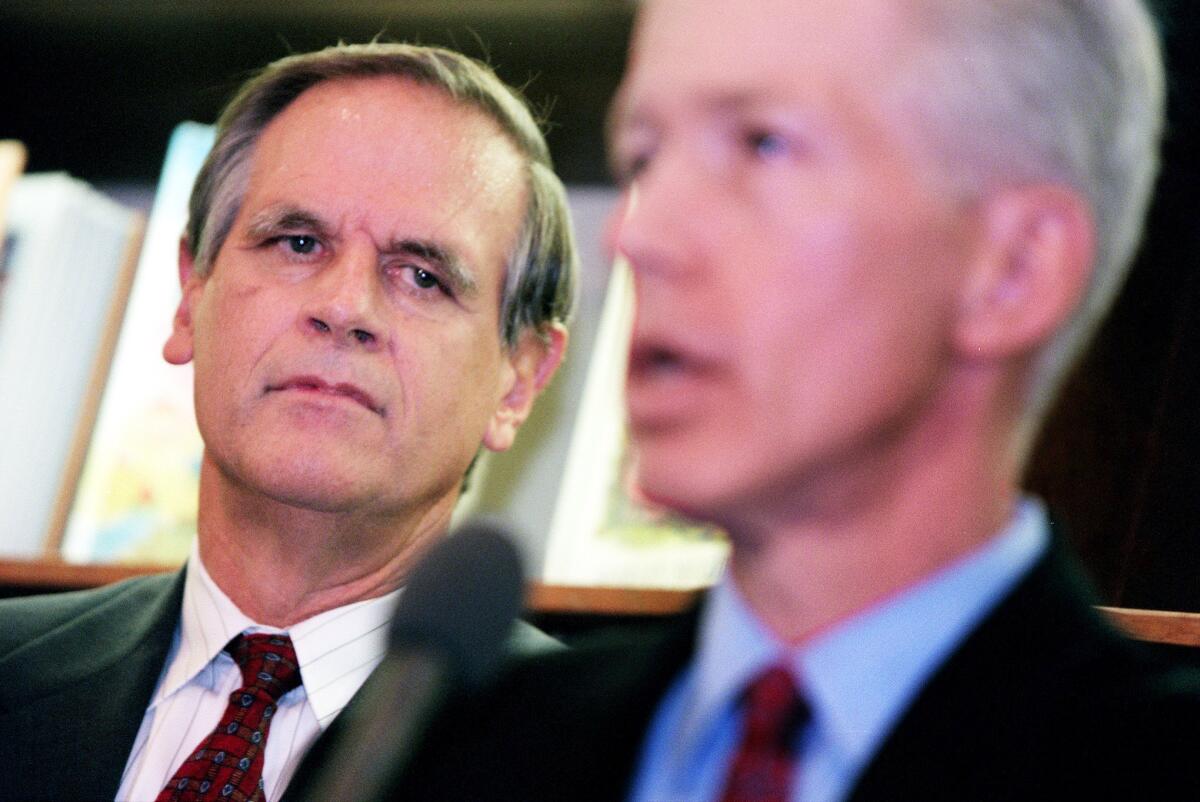Column: We need more lawmakers like Gary K. Hart. But they’re a rarity in this era of polarization

- Share via
SACRAMENTO — Gary K. Hart was the kind of quality politician that many cynical voters don’t believe exists today.
They do — at least they have his potential — but in these polarized times, it’s harder, if not nearly impossible, to perform with the same grace, courage and effectiveness as the former legislator.
Voters tend to see politicians of another party as captives of special interests — be it labor or corporate — and as ignorant, corrupt liars.
Yes, far too many are beholden. To run for a major office, a candidate needs campaign contributions from interests that only invest in politicians who will help them. And under term limits, legislators have become weaker and interests stronger.
The voters’ uncompromising “I’m right, you’re stupid” attitude is reflected in the Legislature — not because lawmakers privately share that view, but because they’re beholden to the people who elect them. They’re leery of acting against the grain of their polarized constituents.
“Gary Hart would be frustrated and pissed off today,” says state Sen. Bob Hertzberg (D-Van Nuys), a former Assembly speaker.
I suspect he would have refused to cave in and quietly fought back with smarts and cunning. Or just quit.
Hart, 78, a Santa Barbara legislator for 20 years spanning the mid-’70s to the mid-’90s, died from pancreatic cancer on Jan. 27.
He is best known for fathering charter schools in California. He had to battle the powerful California Teachers Assn. — a paradox since the Democrat was a dedicated teacher and a liberal on most issues except education. On education, he was a reformer who challenged teachers and students to step up their game.
He fought the teachers union over collective bargaining. If a conventional school turned charter, the CTA wanted teachers to continue being covered by their bargaining agreement. Hart insisted they vote on whether to remain unionized. His bill was signed in 1992 by Republican Gov. Pete Wilson — not a fan of public employee unions.
Hart was ideological but open-minded. Competitive but not ambitious for higher office, although he ran twice for Congress and failed. Principled but pragmatic. Friendly and respected.
Both legislative houses eulogized him last week. He served eight years in the Assembly and 12 in the Senate, where he was chairman of the Education Committee the entire time.
“He was a problem solver, never confrontational,” said Sen. Jim Nielsen (R-Gerber), who was the Senate minority leader when Hart was a senator in the 1980s.
“He also was courageous,” Nielsen observed, referring to Hart’s successful fight against the CTA, a Democratic meal ticket in election campaigns.
You don’t normally hear high praise from a Republican for a liberal Democrat these days.
Sen. Steve Glazer (D-Orinda), a contemporary target of the CTA, said that Hart “showed me the power of a soft voice.”
Hart was a longtime state legislator who wrote California’s law authorizing charter schools in 1992.
I asked him to elaborate.
“He wasn’t a ‘pound the table louder than anyone else’ type of politician,” Glazer replied. “He had charm and graciousness. He did the research and knew the subject. He would look at it from the opposition side as well as his own. Those things allow you to speak with a softer voice and still be effective.”
Glazer added: “He was the classic citizen legislator.”
That’s not hyperbole.
An admirable trait of Hart was his passion for classroom teaching. He began his career as a high school history teacher and often returned to the classroom while a legislator and afterward. It was his hobby.
He periodically taught at Kennedy High School in Sacramento, keeping up on modern education, trying new teaching methods and working students hard.
Hart called it “a reality check.”
He also co-founded an education reform institute at Cal State Sacramento.
A family-written obituary read: “He felt our democracy could only thrive with a strong public education system where students from varied backgrounds could learn to work together and every student with quality instruction and hard work had opportunities to pursue their dreams and succeed.”
The opportunity for diverse students to learn to work together has always, for me, been the strongest argument for sending kids to public schools.
Hart was student body president at Santa Barbara High School, where he was a star multisport athlete. The 6-foot-4 end went to Stanford on a football scholarship and roomed with a member of the golf team, future Gov. Gray Davis. They were Zeta Psi fraternity brothers.
“This was kind of an ‘Animal House’ experience, and we were not cast for those roles,” the staid Davis once told me.
After obtaining a master’s degree in education at Harvard, Hart joined civil rights marches; taught at Tougaloo College, a historically Black school in Mississippi; enlisted in Sen. Eugene McCarthy’s 1968 presidential campaign; and became an anti-Vietnam War protester.
Despite that liberal activism, middle-of-the-road coastal voters elected him to the Legislature, where he remained a lefty — except not always on education.
Hart successfully authored bills to improve teacher training, reduce class sizes and require higher academic standards for students.
He also pushed through legislation offering the nation’s first solar tax credit.
Davis appointed Hart as education secretary. It was a job with a fancy title but zero power, except to advise the governor. Hart used his credibility with lawmakers to steer Davis’ education reform package through the Legislature.
“Gary was highly admired and respected by virtually everyone, even people who disagreed with him,” Davis told me. “You can’t say that about a lot of people in Sacramento.”
We need more lawmakers like Hart who are beholden to their conscience. But they’re an increasing rarity with term limits in the era of polarization.
More to Read
Sign up for Essential California
The most important California stories and recommendations in your inbox every morning.
You may occasionally receive promotional content from the Los Angeles Times.












